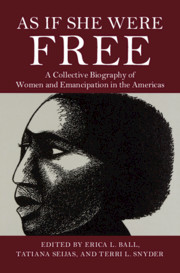Book contents
- As If She Were Free
- As If She Were Free
- Copyright page
- Dedication
- Contents
- Figures
- Contributors
- Elizabeth Catlett and the Form of Emancipation
- Acknowledgments
- Introduction
- Part I Claiming Emancipation during the Rise of New World Slavery
- Part II Experiencing Freedom during Slavery’s Expansion
- Part III Envisaging Emancipation during Second Slavery
- Part IV Enacting Emancipation in the Aftermath of Slavery
- 20 María Remedios del Valle, Nineteenth-Century Argentina
- 21 Lumina Sophie, Nineteenth-Century Martinique
- 22 Emma Lane Coger, Nineteenth-Century Illinois, Iowa, and Missouri (US)
- 23 Laura E. Davis Titus, Nineteenth-Century Norfolk, Virginia (US)
- 24 Carrie Williams Clifford, Nineteenth- and Early Twentieth-Century Ohio (US)
- Bibliography
- Index
23 - Laura E. Davis Titus, Nineteenth-Century Norfolk, Virginia (US)
from Part IV - Enacting Emancipation in the Aftermath of Slavery
Published online by Cambridge University Press: 24 September 2020
- As If She Were Free
- As If She Were Free
- Copyright page
- Dedication
- Contents
- Figures
- Contributors
- Elizabeth Catlett and the Form of Emancipation
- Acknowledgments
- Introduction
- Part I Claiming Emancipation during the Rise of New World Slavery
- Part II Experiencing Freedom during Slavery’s Expansion
- Part III Envisaging Emancipation during Second Slavery
- Part IV Enacting Emancipation in the Aftermath of Slavery
- 20 María Remedios del Valle, Nineteenth-Century Argentina
- 21 Lumina Sophie, Nineteenth-Century Martinique
- 22 Emma Lane Coger, Nineteenth-Century Illinois, Iowa, and Missouri (US)
- 23 Laura E. Davis Titus, Nineteenth-Century Norfolk, Virginia (US)
- 24 Carrie Williams Clifford, Nineteenth- and Early Twentieth-Century Ohio (US)
- Bibliography
- Index
Summary
Born at the beginning of the Civil War in Norfolk County, Virginia, Laura E. Davis Titus was a member of freedom’s first generation in the United States. Titus was among hundreds of African America women who redefined their place in society through education, civic endeavors, professions, and community advocacy. A teacher and a strong advocate for African American access to education, Titus took her work beyond the walls of the public schools to her home community, participating in the National Association of Colored Women, organizing community institutions, and founding settlement homes that provided young girls coming through Norfolk with much needed safe spaces, guidance, and employable skills such as cooking and sewing.This effort emerged from her participation in the black women’s club movement that was partially inspired by the activism of the Progressive Era. Titus embraced teaching and social service as a means for racial uplift.
Keywords
- Type
- Chapter
- Information
- As If She Were FreeA Collective Biography of Women and Emancipation in the Americas, pp. 411 - 425Publisher: Cambridge University PressPrint publication year: 2020

